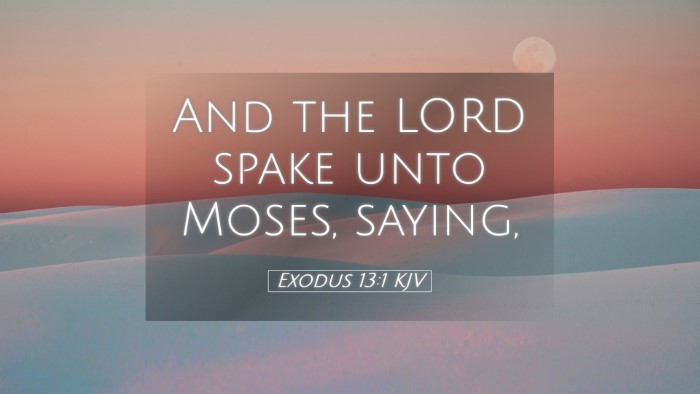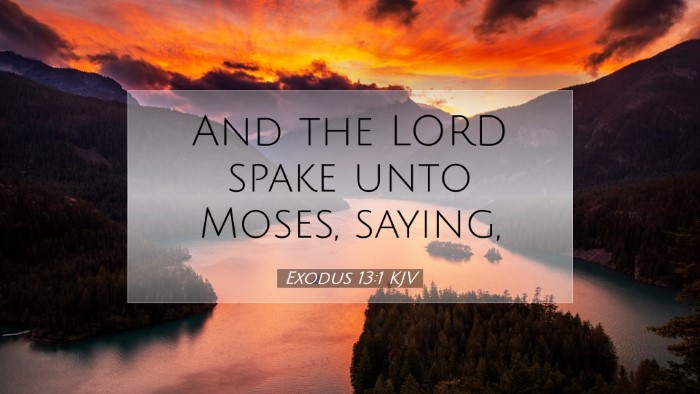Exodus 13:1 - Biblical Commentary
Bible Verse: "And the LORD spake unto Moses, saying," Exodus 13:1 (KJV)
Introduction
The book of Exodus serves as a crucial account of Israel's deliverance from Egyptian bondage, the establishment of divine law, and the initiation of the covenant relationship between God and His people. Exodus 13:1 serves as a pivotal moment reflecting God's continual guidance and the beginning of a distinct section emphasizing the importance of deliverance and obedience.
The Voice of God
This verse opens with a significant declaration—“And the LORD spake unto Moses, saying.” The divine communication recalls God's active engagement with His people.
- Divine Authority: The term "LORD" (YHWH) signifies God's covenantal relationship with Israel, highlighting His authority over both nature and His chosen people.
- Importance of Communication: God speaks directly to Moses—a mediator—indicating the importance of clear guidance. It emphasizes that spiritual leadership requires attentiveness to divine commands.
- Historical Context: This moment follows the Exodus and the Passover; God’s instruction here continues to shape Israel’s identity and their duties as a nation set apart.
Recognizing God's Instructions
Moses acts as a conduit for God's directives. The necessity for Israel to heed these words is paramount. Various commentaries highlight this relationship:
- Matthew Henry: He notes the gravity of God's ordinances, emphasizing that they are not mere suggestions but commands meant to be followed. Obedience is framed as an expression of faith.
- Albert Barnes: Barnes elaborates that God’s communication signifies the beginning of special regulations concerning the consecration of the firstborn, a theme expanded upon in subsequent verses.
- Adam Clarke: Clarke underscores the significance of following God’s instructions in a manner that acknowledges their divine origin, highlighting how obedience leads to spiritual protection and blessing.
The Purpose of God's Command
God’s commands often serve multifaceted purposes, including:
- Remembrance: The firstborn’s consecration recalls the Passover's significance and God’s deliverance of Israel from Egypt (Exodus 13:2). This action serves to instill memory within the people regarding God's sovereign acts.
- Identity Formation: The commands given here are integral in defining the people of Israel; they set them apart as God’s chosen nation, tasked with living out His covenant.
- Future Generational Significance: The instructions not only pertain to present actions but are also intended to shape future generations (Exodus 13:8). This focus on teaching future generations underscores the continuity of faith throughout the life of the Israelites.
Application for Today's Readers
The proclamation found in Exodus 13:1 resonates beyond the historical context of Israel's exodus. For contemporary readers, especially pastors, students, and theologians, the implications remain profound:
- Listening to God's Voice: Just as Moses received direct communication from God, believers today must seek the mind of God through prayer, scripture, and the leading of the Holy Spirit.
- Obedience as Worship: Following God’s commands is an act of worship that invites His presence and reflects trust in His overarching plan for our lives. It stresses the importance of a heart aligned with God's will.
- Legacy of Faith: The emphasis on passing down God’s commands underscores a critical aspect of faith—cultivating a rich spiritual legacy that informs future generations.
Conclusion
Exodus 13:1 serves as a gateway not only to the specific commands given to Israel but also to the broader themes of divine guidance, obedience, and generational responsibility in faith. As believers engage with this passage, its implications regarding worship, leadership, and legacy resonate powerfully, urging a faithful response to God’s will.


